UPDATE: Thanks to Brave Words for their mention of this post in their nice piece on Powermad.
Beer and metal fans unite! Darkness Day at Surly Brewing is already underway, but there's still plenty of time to get out and see some great metal bands, drink some fantastic beer, and get your hands on the hotly anticipated release of Darkness, Surly's world-renowned Russian imperial stout. You can read all the details about the event in my previous post, but playing Darkness Day this year is Impaler, Exhumed, Vulgaari, Rivers Of Nihil, God Came From Space, and Fallen Empire.
Powermad guitarist and Surly Head Brewer Todd Haug. All picture are from Darkness Day 2012.
I had the chance to talk with Surly's Head Brewer Todd Haug, who is also the longtime guitarist for thrash band Powermad. Powermad released a string of material in the mid-80s that culminated in the awesome Absolute Power album in 1989. After Powermad ended, Todd pursued his love of beer professionally, rising through the ranks at local breweries, including a stint at Summit before helping to start Surly Brewing as Head Brewer. More recently, Todd has also begun playing guitar in local sludge/doom band Vulgaari.
In recognition of Darkness Day, this interview focuses on Powermad since the band is about to release their first album of new material in nearly 25 years! I'll leave Todd to inform you on the details below, but one highlight is the inclusion of Soilwork drummer Dirk Verbeuren, who plays on the record and with the band live. After this interview took place, Todd informed me that Powermad is hoping to play some live shows around the Twin Cities in December. Of course, beer came into our conversation, and it gave us the chance to discuss the convergence of the beer and metal worlds. We spoke for nearly an hour, and here is the great bulk of our discussion.
Twin Cities Metal:
Hello, Todd! I appreciate you taking the time to talk about music.
Todd Haug: Yeah,
no problem! I’m excited to talk about it! I always talk about beer so it’s
always good to mix it up now and then.
TCM: Although I’m
very familiar with your beer, I had never made the connection between you and
Powermad until I saw it on the Surly site last year.
TH: It’s kind of
amazing how many people don’t make that connection. Every week there’s someone
who says, “I’ve never heard of your beer but I remember your band,” or vice
versa.
TCM: What can you
say about Darkness Day for those who aren’t familiar with it?
TH: It’s going to
be an outdoor event, we’ve outgrown the indoor space here for the music. We’ve
got plenty of room, probably for 2,300 people give or take, so I’m not
anticipating people having any problem enjoying the show because there’s too
many people here for this event. There will be tents and provisions. You can’t
go inside the brewery – we can’t hold the music inside the brewery anymore
there’s just not room. We’re going to start the music kind of early because
we’ve really got two events in one. We’re obviously releasing our beer,
Darkness, that morning and a lot of people camp out for that. That starts at 11
in the morning, and we’re also going to start the music at 11. Every band will
play 30 or 45 minutes. It’s a long day but we want to stretch it out because we
want everyone to have a chance to come out because it’s free. We’ll be selling
glasses of Darkness and a bunch of other special beers. It’s almost a mini-beer
festival of our own, there’ll also be vendors and food trucks. The weather
usually cooperates. It’s over at 6 before it gets too cold, but there’s plenty
of room inside if people need to run inside to get warm. The event will be held
rain or shine.
TCM: Darkness Day
is always a lot of fun.
TH: We want to
keep the event growing and developing. A lot of people don’t really want to buy
a bottle of Darkness but they want to come out to the brewery since this is our
big metal event. We try to tie into the local metal community and them to come
out. You don’t have to spend any money at all to just come out to enjoy the
music and have fun. As the brewery gets bigger and we get more space to do this
stuff—down the road when we get our new production facility we’ll have the room
and the ability to do more music events. That’s the direction things are
heading. We’re also trying to build up more of a national presence with some of
the acts. Powermad’s been lucky to play at Darkness Day in the past. We also
played at Darklord Day, which is at a brewery in Indiana called Three Floyds
just outside of Chicago in 2012 with High
On Fire, Eyehategod, and Argonauts. So that was our Russian
imperial stout tour of 2012 (laughs). Two shows at two breweries in same year
that focus on beer but then there’s metal involved.
TCM: Have there
been any changes in the membership of Powermad?
TH: The most
recent change has been our drummer, who we’ve been working with the last couple
of years is Dirk Verbeuren. He’s not from Minneapolis, he’s original from
Belgium, and he’s also in Soilwork.
He’s also played on Devin Townsend
records and done a lot of collaborative work over the years with different
people and different bands. We contacted him when our last drummer Dodd moved
back to North Carolina. We needed a drummer and Dirk was in on the music. He’s
kind of an old school thrash/grindcore guy, and an amazing technical drummer
and had some time to work with on the live shows during the last couple years
and with the new recording that will be coming out.
TCM: So what’s
the status of the new music? You released one song, “Souls Descending”, through
your website, so has a whole album been recorded?
TH: Yeah, we did
“Souls Descending” to try out some new ideas. I’ve really changed, obviously,
since the last time we were in the studio. Technology has changed the way we
write because we’re all busy with very independent lives. We wanted to continue
working together but we can’t just get together every night like we used to. We’ve
all set up Protools studios in our basements just to do simple guitar tracking
as a way to create ideas and be able to share them electronically. Any time of
the day I can record a riff and send it to Jeff and Joel and get their feedback
immediately. It took us a while to figure out that process. We used to focus on
having rehearsal, having the drummer there and feeding off each other. That’s
always been a big part of our music, having the energy that comes with fast drumming.
So this process has taken us quite a while as a result, but we released “Souls
Descending” so we could give some fans an idea of what we were working on
because they’ve been waiting a long time. We also wanted to try out an engineer
that Joel knew out in Virginia and we went out to his studio. The drums were
done, Dirk had recorded his tracks at his studio in Cleveland and we just did
the guitars, bass, and vocals over a weekend out in Virginia to give it a trial
run and get the song out. We continued writing the rest of the songs, and it
helped us decide to go back and work with Kevin more. We decided to have Daniel
Bergstrand mis it, who’s a prominent metal producer and mixer in Sweden. The
album is done, we just have to make decisions about artwork and figure out how
we’re going to release it. We’ve had to spread everything out, Joel’s got his
own business. It’s frustrating that it’s taken this long, but as it gets closer
we’re all getting fairly impatient. It’s all been self-funded, so we’ll
probably end up shopping it to see if we can get some support with getting it
out there and with the marketing. There are no plans to do any extensive
touring, but we’d definitely like to get out to more festivals. We went to
Germany last year and it was great, but it’s a lot work to go over there for
one show. We’d love to be out for the festival circuit in Europe during the
summer. There’s a big market for the kind of metal we play and I think people
will be very receptive. Dirk’s had a busy year with Soilwork so we’ll obviously
have to plan ahead if we get the opportunities. We’ve got nothing to prove,
this is something we wanted to do for ourselves but we also feel like there
were things left uncompleted. The band just kind of dissolved. Everybody
drifted away and did other things, there was never a decision to just break up
so we were just in this weird state of stasis for 15 years.
TCM: Was it the
typical story of lack of label support that led to the band’s demise after Absolute Power came out?
TH: Well, that
was part of it. I was super young – we signed the deal the summer I graduated
from high school. I went from high school to having a record deal with Warner
Bros. I skipped the whole process of being an adult and working. When we got
dropped by Warner Bros. when grunge was taking over—about 70 acts got dropped
from the label that quarter—we kept going, we kept writing and rehearsing, we
played some shows and did some tours, but there seemed to be a waver in our
direction, song writing-wise. So in hindsight, I’m really glad those songs
never made it because I don’t think they were what they should’ve been.
Everybody wanted us to do this fast, technical stuff, but we were going in
another direction. We all felt really strongly about it at the time, but I’m
that material never got released because it wasn’t really Powermad-like at all.
We’re pretty excited about the new record because it’s contemporary yet it
captured the original spirit of what we like to do. We like to play fast and
tight, and lot of it comes across great live. It doesn’t have super brutal
vocals, obviously, that’s never been what we’re about. The new songs give Joel
a lot of room to sing and do the things he’s always done. It will be
interesting to see what people think.
TCM: Well I think
anyone who hears “Souls Descending” won’t be disappointed.
TH: There are a
lot of singers that can sing for a long time; it’s a discipline just like
playing guitar. You’ve got to take care of your voice and train. Given some the
shows we did 15–20 years ago, Joel’s voice sounds even better in a lot of ways
now.
TCM: Was a second
album ever recorded back 20 years ago, or were you just demoing songs?
TH: We did a lot
of demos for Warner Bros., but then we got dropped. We were just thinking, well
now what? I didn’t have anything else going on, I didn’t have a career, I was
21 or 22, and then a lot of things happened. We had done a lot of work finding
the right drummer, Dodd, that could fit with us, but more importantly could
influence the song writing. He wasn’t just a drummer, he could pick a guitar or
sit down at a piano and write songs. That was important to us. Right after we
got dropped we were making some moves on finding a manager and doing things
that would help keep the project going to able to record some more stuff, and
then unfortunately Dodd decided to leave and do his own project. At that point
a bunch of things in my life had happened. I had already discovered my love of
beer, and I had a pretty job at a brewery. I decided to take some time away
from the Twin Cities area, so I went to Alaska for three or four months. I came
back and was able to get back into my job at the brewery. It went from one
creative thing, writing and playing music, and transitioned into a world of
beer. I ended up playing in Dodd’s band, as well. So I’ve always been playing
guitar, Jeff playing bass, Joel writing songs. We’ve all been doing our own
thing. Really, it was numerous requests from festival organizers in Europe that
got us back together. It sounded like fun to go over there and play, then the
writing of new material started to happen. The first festival we did in Germany
was five or six years ago. It’s taken us a while to get some songs together.
Once we relearned everything and got the process down, everything went kind of
fast. Like I said, there was never a band meeting where we made the conscious
decision to break the band up. I had broken my finger at work and couldn’t play
guitar for a while. I became disillusioned about everything and what I thought
I would be doing, just like every other 22 year old.
TCM: Well,
everybody has to grow up, and priorities change when people have a family to
support.
TH: Yeah, none of
this sounds very metal! It’d be a lot more metal if we’d gotten into a big
fight, but the band just drifted apart and there’s a lot of other things to do
when you’re that age. We all wish we were younger, but at the same time, I
don’t think the music we just finished writing would be anything like what it
is without all the experience we brought to the table this time. Influences,
experience, and even a certain amount of maturity are all important and I think
the songs are better as a result. I’m excited to have people hear it. “Souls
Descending” is a good example of what people can expect from the record. There’s
some slower tempo stuff, but we didn’t get all sappy. There are no ballads, no
chanty choruses, no jump-metal, nü-metal. We do use extended range guitars now,
we use eight strings, but we try to mix it up. We use similar, old standard
voicing and tuning, but then in certain sessions we’d go into the low registers
which added a modern sound, but it gave the songs a dark, more brutal sound
without being death metal or black metal. It gives us more range on the guitar,
which is kind of fun.
TCM: How many
songs were recorded for the new album?
TH: Ten, but we
recorded a couple additional songs that could be used for different releases
around the world. Those are a couple songs that we thought might not fit on
this record. We’re all big fans of a lot of different kinds of metal so we
really wanted to stay focused and make sure these meet certain criteria for
sounding like Powermad. We also wanted to be conscious of the flow of all the
songs together. So there are a couple songs that lean more doom or stoner
metal, and we thought to somebody that hasn’t heard us that might too far of a
departure. It might be nice to use these as bonus tracks. We’ve a handful of
partial ideas that we can use for the next record, that’s the plan.
TCM: What are
your best and worst memories of the band’s original run?
TH: Let’s start
with worst. There are always personality and personnel issues in any work
environment, and I don’t think I had the skills at that age to handle that kind
of adversity, whether it was someone in the band, a record company executive, a
manager, or a guy in a band that we’re opening for who’s an asshole. I was
very, very quiet in my 20s, and my personality continued to develop. That was
difficult for me because I felt like I couldn’t really say anything, so I
didn’t but I probably should have. The other thing was we probably made some
decisions because we didn’t know any better. We were young, but we were also
excited. When you’re in a band and someone offers you money, you think, “I
don’t want to go to a job.” Having a job is what inspires a lot of things,
whether it’s to go back to school, to write music, or anything. Even though I
love my job and what I do—I have the best job in the world—it still motivates
me to be creative and do other things outside of work. I never had that because
I went right from high school to recording and touring. That would probably be
the worst part, I don’t think I really appreciated what we had even though we
kept pinching ourselves thinking, “Is this really happening?” When big changes
happen, it’s hard without the support of the record company. We weren’t with
any underground company. If we were I think we would have been fine. When
grunge took over we had to start all over, basically. The good part of it all
was being able to tour at a young age. That’s how I discovered regional, local,
flavorful beer. We’d always try to get some without being carded, and if we got
kicked out we always got some brought to the room. Touring in the Portland and
finding beers that we couldn’t get here is what started on the path of home
brewing when we weren’t touring. That led to my first brewery job at Summit in
St. Paul when I was 21. Just having these experiences was great. I know it sounds
corny and easy, but being able to meet people that enjoy something that you’ve
created was wonderful. The studio time and experience we had was also pretty
amazing. We got to go to New York and record at the Record Plant, which is the
last place John Lennon was before he got shot. Unless you’ve got a ton of money
that’s not how you record anymore. All the guys in the band got along. We’ve
always been friends, but it’s just not like it used to be when I saw everybody
every day.
TCM: I have a
couple bootlegs back from the 80s that have some unreleased songs such as “Evil
Slayer”, “Fried Alive”, and “Confusion Reigns”. Do you have a vault of
unreleased songs or demos, and any plans to release any of this?
TH: I would love
to. There are no plans to, honestly. That stuff was written and recorded before
I was in the band. That was the first stuff they wrote during the first year of
the band when Jeff, Joel, Bill Hill, and Adrian were doing it. Bill was the guy
I replaced. We’re doing “Chasing The Dragon”, which is on the Combat Bootcamp
EP, in the set now. I’d love to do more of that old stuff, those types of old
school-sounding riffs are really popular again now. I’d have to chat with Joel,
but I don’t think they want to do too much of those songs. I think it’d be fun
to get this record out, then do some type of historical compilation or at least
make this stuff available. We have that problem now. Warner won’t release Absolute Power, and we need to figure
out a way to make our catalog available to people. Take a band like Enslaved. I love that band, from their
earliest stuff to what they’ve most recently put out, and it’s amazing to go
and listen to the progression over a 20-year period. Same type of thing with Mastodon. I’d love for people that
don’t know us to be able to do that type of thing with us, but logistically,
when you have to deal with old record companies I’m not sure how that’s going
to happen. We don’t have the money to hire a lawyer to make it happen. We own
all our own publishing, but there’s more to it than that. We’d for people to be
able to buy all our music on our website without having to go through iTunes or
Amazon so we could control it more and keep things simplified. So that’s the
next step. Once we get the new record out, hopefully the older stuff will
follow.
TCM: Aside from
having bands play at the brewery, I remember coming out to buy growlers and
hearing Slayer being played in the
brewery, so it’s clear you’ve got metalheads there. Has there been a conscious
attempt to associate Surly with metal fans?
TH: Haha,
yeah…but it’s not driven by everybody. Omar, the owner, is real tolerant of a
handful of us and our love of metal, but obviously we don’t just hire people
that are into metal, nor would we want to. I need the right help. Still, we’ve
got a big stereo here that cranks out metal probably 80% of the time. Everyone
likes the energy. If it’s conscious, it’s only because that’s what we were into
as we were building the place, it’s what keeps us going on long days. We all
like to go to shows, and we like to get our beer out at live music events,
whether it’s The Fouronthefloor
which obviously isn’t metal, or at the Triple Rock, or other places. We helped
sponsor the Root Of All Evil Anniversary Show, and we’re trying to do more.
We’re trying to do things will all types of music, but we definitely aim for
more metal than other brewers.
TCM: Has Surly
thought about endorsing any local or touring metal bands like Jägermeister?
TH: I’d love to,
but right now we’re at this weird, awesome place where we can’t afford to give
beer away or spend thousands of dollars on sponsorships for a tour. Down the
road, who knows? How awesome would that be if craft breweries were sponsoring
national tours? Some day it’s going to happen. A couple breweries will probably
beat us to it just because of their size, but I guarantee it probably won’t be
hard rock or metal. But there’s also some fallout with that, and we’ve seen
some of it. There’s some people that don’t like it or think it’s too dark or
too evil or whatever. We get complaint emails saying that we worship Satan
because the beer is called Darkness and because of the label. Some people find
it offensive, but as a business we can’t give people the middle finger all the
time. It’s awesome to have this metal vibe at Surly going, but we’ve also got
to be smart about it, too. It’s funny that you mention this because I’ve
probably got more friends and acquaintances that are professional metal
musicians that I’ve gotten to know through beer than through my guitar playing.
There’s kind of this huge underground following with metal people, which is
pretty awesome to see. I had no idea until 3-4 years ago. There will be a time
when a craft brewery sponsors a metal tour, I just hope it can be us. We don’t
have a market presence in all the states yet, and we don’t have the volume of
beer to support it at this time.
TCM: Do you see
any parallels between the rise of small, independent brewers and the ability of
bands to market themselves and succeed despite the implosion of the music
industry?
TH: Yeah,
absolutely. It’s all about creative people, whether it’s in beer or any type of
music, and being able to do it on a small scale is what makes it personal.
There’s a connection without all the bullshit. You get to see them, you might
get to meet them, you can see them in different venues, and you might even be
able to see musicians play different genres of music. It’s definitely the same
with brewing. We do some “extreme” beers, but we also make some delicate beers
that we’re all really proud of because they’re not easy to make. It’s the same
with art and music. I think beer is still a common man’s drink, but it’s been
elevated enough but not snooty. There’s something cool about beer being made in
your town, not some wine from California. There’s more of that connection
because it’s a local artisan thing. That correlates to music and art.
TCM: Do you ever
step back and think about what you’ve accomplished with Surly? On the face of
it it seems incredible – you’ve been heralded as a world-class brewer, the
Minnesota Governor signed the so-called Surly bill, and you’ve got legions of
fanatical supporters.
TH: Yeah,
absolutely. Omar and I quite regularly say, “What the hell happened?” There was
never this plan laid out for these things to happen. I know it sounds corny,
but it was always about trying to make the best beer that we can. We felt the
market was ready, and with the equipment and experience we both brought to the
table we were ready. But we really didn’t anticipate the national attention and
exposure. It’s one thing to be a successful small brewer in an over-hungry city
such as Minneapolis-St. Paul, but with the advent of the Internet everybody’s
got an opinion and evidently there’s a lot of people out there that like our
beers. There’s a lot of guys that are trading our beers. I recently heard from
my buddy Dave Witte, who’s the drummer for Municipal
Waste, and he was drinking our wet hop beer Wet at a bar out in Virginia. I
was like, “Where did you get that?” He said he had traded for it and took it to
a bar so a bunch of people could try it. That’s the part we didn’t count on or
even understand. So part of it is dumb luck and timing, but part of it was a
couple of guys with the experience and maturity in different areas, business
and brewing, that were brought together. A lot of new breweries don’t have
those experiences so it’s going to be tougher for them. I try not to think
about it. There’s always days where shit doesn’t go right – you won’t hear
about it and the guys on Beer Advocate won’t hear about it. As great as it’s
been, there’s always stuff to deal with every day. It keeps you in line a
little bit. People say, “Oh, you’ve got the best job in the world.” Well, yeah,
it’s cool if you just look at some parts of it and think I just drink beer all
the time. But there’s a lot of things that don’t go right, equipment that
doesn’t work right, staffing and management, all that stuff that goes into
growing a business. It’s enough to keep you humble and to know that in a split
second everything could change radically. So that keeps us in check. It is
crazy, honestly, and it does blow my mind. I still just want to make great
beer, and I’m glad people like it.
TCM: What’s the
most fun part of Darkness Day for you?

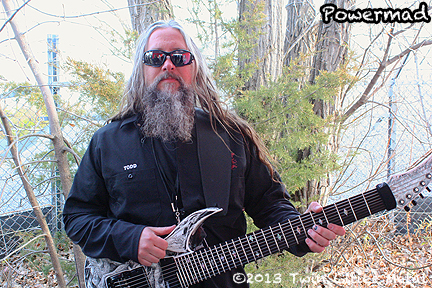

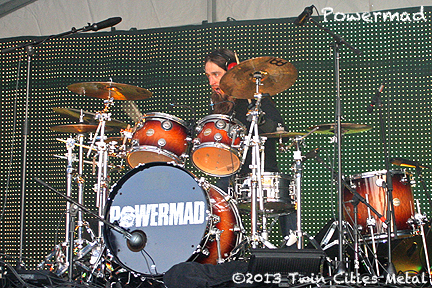
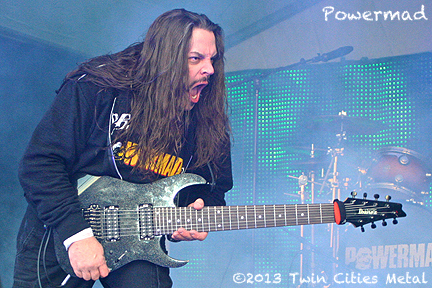
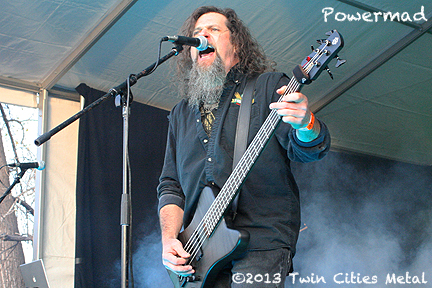
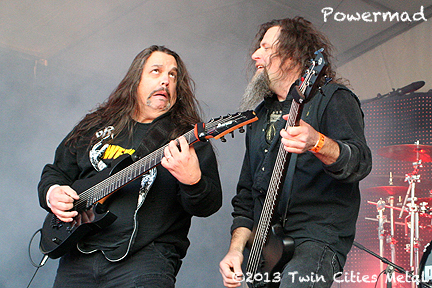
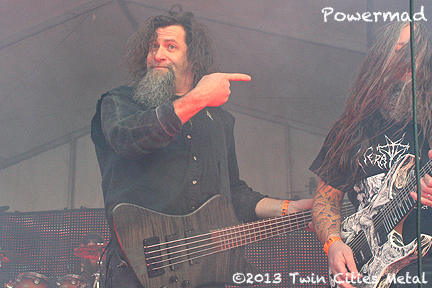
Cool interview. I was a huge Powermad fan back in high school back in the late 80s...and for that matter I still am. Always wondered why they never put out material past Absolute..now I know. New recordings are gonna rule. Put er on vinyl and I'll get a 4 pk of Furious, grab my guitar and try to play along.
ReplyDelete